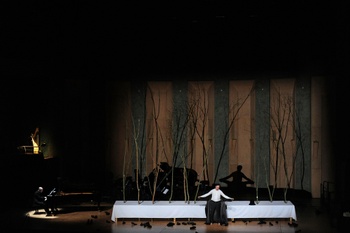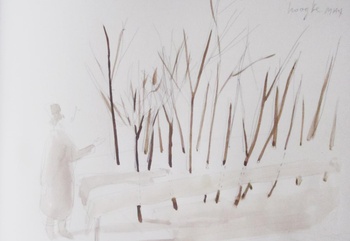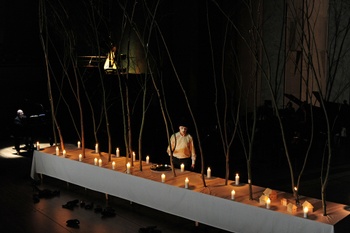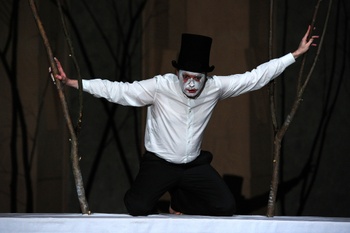(© Luc Hossepied)
The KlaraFestival has been promoting classical music for ten years now. The key word of this birthday edition, taking place throughout the city, is adventure. As is shown by director Johan Simons and visual artist Michaël Borremans, who joined forces for a journey through the snowy landscapes of Schubert’s Winterreise.
Some of the sacred cows of classical music staging – form, content, and location – are revisited by this year’s festival. Even Franz Schubert’s sacrosanct Winterreise song cycle – which is more or less the Holy Grail of the Romantic lied – is being tinkered with. And not by just anybody: the boss of the Münchner Kammerspiele (and soon to be of the Ruhrtriennale too) Johan Simons has joined forces with the visual artist Michaël Borremans to revamp it.
An actual show, in other words?
Johan Simons: This project came my way via Guy Coolen of Muziektheater Transparant. I have often done things with Transparant before. They asked me whether I would take on the overall staging. For this Winterreise is somewhere in between a concert performance and a play. And that is a field that I have always been very interested in. I think this music by Schubert is really beautiful. And Michaël Borremans as a set designer! I really love his work.
KlaraFestival: we’re all going on a Winterreise


(© Michaël Borremans)
Michaël Borremans: Thanks, Johan. [Laughs] I designed a stage setting, a sort of table construction. At first, it is completely empty, to represent the solitude of the character. As time passes, the table turns into a landscape, because the singer does all sorts of things with it. So, as a viewer, you straight away associate it with a bleak winter landscape with just a few bare trees. It’s that simple! The only restriction was that it couldn’t cost very much. When I saw the design onstage at the Cité de la Musique [in Paris, where the world premiere took place – RD], I could see that it was just the way I had imagined it. It is very exciting, as a commission like that is an interesting sideline alongside what I usually do. I was keen to do it, too, as it is an honour to be able to contribute something to this masterpiece by Schubert.
Where did the idea come from of staging a lieder cycle, which is, after all, a largely static phenomenon with a singer and a pianist?
Simons: Well, we wanted to approach this work with images. So that, as a viewer, you could identify even more with the loneliness of this character. You see, music has enormous power. For me, music is the most beautiful art form of all! In music, what you hear is completely abstract. So everyone can create their own feelings and memories to go with it. Music, in other words, is open to multiple interpretation. And that, for me, is the enormous power of music. In this work of Schubert’s, of course, because of the words and the way he composed it, how you hear it is steered in a particular direction. You find yourself within the loneliness of someone who has left home and is walking through a winter landscape. You did that really well, Michaël. Very simple, and very beautiful! So you are dealing with identification. Even if you are not familiar with that feeling of loneliness – although I think everyone does know it – through the music you can still sympathise or identify with the person singing. In Winterreise, moreover, each separate song tells its own story. The whole thing is a sequence that starts somewhere and ends somewhere too. But what is constant is that you are passing through a landscape.
Michaël Borremans: Thanks, Johan. [Laughs] I designed a stage setting, a sort of table construction. At first, it is completely empty, to represent the solitude of the character. As time passes, the table turns into a landscape, because the singer does all sorts of things with it. So, as a viewer, you straight away associate it with a bleak winter landscape with just a few bare trees. It’s that simple! The only restriction was that it couldn’t cost very much. When I saw the design onstage at the Cité de la Musique [in Paris, where the world premiere took place – RD], I could see that it was just the way I had imagined it. It is very exciting, as a commission like that is an interesting sideline alongside what I usually do. I was keen to do it, too, as it is an honour to be able to contribute something to this masterpiece by Schubert.
Where did the idea come from of staging a lieder cycle, which is, after all, a largely static phenomenon with a singer and a pianist?
Simons: Well, we wanted to approach this work with images. So that, as a viewer, you could identify even more with the loneliness of this character. You see, music has enormous power. For me, music is the most beautiful art form of all! In music, what you hear is completely abstract. So everyone can create their own feelings and memories to go with it. Music, in other words, is open to multiple interpretation. And that, for me, is the enormous power of music. In this work of Schubert’s, of course, because of the words and the way he composed it, how you hear it is steered in a particular direction. You find yourself within the loneliness of someone who has left home and is walking through a winter landscape. You did that really well, Michaël. Very simple, and very beautiful! So you are dealing with identification. Even if you are not familiar with that feeling of loneliness – although I think everyone does know it – through the music you can still sympathise or identify with the person singing. In Winterreise, moreover, each separate song tells its own story. The whole thing is a sequence that starts somewhere and ends somewhere too. But what is constant is that you are passing through a landscape.

(© Luc Hossepied)
Does this Schubert cycle have a particular significance for the two of you?
Simons: Yes, I do have a thing about landscapes. In my own work, landscapes are often a source of inspiration. I am much less interested in cities, as opposed to landscapes and vistas. That is present in this text. There’s a reason why I live in a village in the Netherlands, even though I am based in Munich right now. In Holland, I only have to walk a hundred meters and I am standing on top of a dyke, with a view over an incredibly beautiful river that has been flowing there for centuries. That fits in very much with Winterreise. When I see that landscape, I can hear Schubert’s music right away. It feels really good that I myself am so small within it. That puts me at ease…that the world doesn’t come to an end with me and that I only have a small part to play. That’s something I like about really large-scale landscapes, like the one Schubert depicts. For me, that is a landscape with lots of snow. And snow – you can feel it in the music too – has a special effect. When snow covers a city, which is something you experience in Munich sometimes, you get a completely different sound in the city. Everything is much more muted and much softer. Life becomes much calmer too, because everything has become too slippery. That’s something Schubert makes very physical in this music.
Does this Schubert cycle have a particular significance for the two of you?
Simons: Yes, I do have a thing about landscapes. In my own work, landscapes are often a source of inspiration. I am much less interested in cities, as opposed to landscapes and vistas. That is present in this text. There’s a reason why I live in a village in the Netherlands, even though I am based in Munich right now. In Holland, I only have to walk a hundred meters and I am standing on top of a dyke, with a view over an incredibly beautiful river that has been flowing there for centuries. That fits in very much with Winterreise. When I see that landscape, I can hear Schubert’s music right away. It feels really good that I myself am so small within it. That puts me at ease…that the world doesn’t come to an end with me and that I only have a small part to play. That’s something I like about really large-scale landscapes, like the one Schubert depicts. For me, that is a landscape with lots of snow. And snow – you can feel it in the music too – has a special effect. When snow covers a city, which is something you experience in Munich sometimes, you get a completely different sound in the city. Everything is much more muted and much softer. Life becomes much calmer too, because everything has become too slippery. That’s something Schubert makes very physical in this music.

(© Luc Hossepied)
Borremans: As a teenager, I was quite carried away by Romantic classical music. [Enthusiastically] Weltschmerz! Reading Goethe! That is a phase you have to go through. It is the music par excellence that presents the tormented person, a canvas onto which you can project all kinds of things. Schubert’s music appeals to me so much because, for me, it is really blues. Especially Winterreise. That’s about the same subject matter, but the blues hadn’t been invented yet. As a 17-year-old, I used to listen to blues musicians too, the likes of Robert Johnson and the Delta blues.
What do you make of the new music by Mark André?
Borremans: I was really curious about that. He wrote a number of – what do you call them? – intermezzi, for in between the songs. For me, they are echoes. It is pretty minimal and, in fact, unobtrusive music too. On the other hand, I don’t think that Winterreise needs anything: the music itself is just wonderful.
Simons: It is very unassuming music, which is something I find really beautiful about it. He works with soft tones, which is very characteristic of his music. His territory is in the pianissimo. Or at least he explores that. Sometimes it becomes a little moderato. But he really makes demands on your ears: as a listener, you have to make an effort to hear what he does. If I could put it in visual terms [smiles], you are walking through a meadow and you come to a little ditch. It is covered, if it has frozen, by a thin layer of ice. You can just barely get across. That is that music for me, very sombre, but it actually makes the walk greater. It is definitely more than just adding something. It enters into a dialogue with Schubert’s music. It takes Schubert’s music even further.
22/3, 20.00, €16/34/44/56, Bozar
KLARAFESTIVAL • 15 > 29/3, Verschillende locaties/Divers lieux/Various locations, www.klarafestival.be
Borremans: As a teenager, I was quite carried away by Romantic classical music. [Enthusiastically] Weltschmerz! Reading Goethe! That is a phase you have to go through. It is the music par excellence that presents the tormented person, a canvas onto which you can project all kinds of things. Schubert’s music appeals to me so much because, for me, it is really blues. Especially Winterreise. That’s about the same subject matter, but the blues hadn’t been invented yet. As a 17-year-old, I used to listen to blues musicians too, the likes of Robert Johnson and the Delta blues.
What do you make of the new music by Mark André?
Borremans: I was really curious about that. He wrote a number of – what do you call them? – intermezzi, for in between the songs. For me, they are echoes. It is pretty minimal and, in fact, unobtrusive music too. On the other hand, I don’t think that Winterreise needs anything: the music itself is just wonderful.
Simons: It is very unassuming music, which is something I find really beautiful about it. He works with soft tones, which is very characteristic of his music. His territory is in the pianissimo. Or at least he explores that. Sometimes it becomes a little moderato. But he really makes demands on your ears: as a listener, you have to make an effort to hear what he does. If I could put it in visual terms [smiles], you are walking through a meadow and you come to a little ditch. It is covered, if it has frozen, by a thin layer of ice. You can just barely get across. That is that music for me, very sombre, but it actually makes the walk greater. It is definitely more than just adding something. It enters into a dialogue with Schubert’s music. It takes Schubert’s music even further.
22/3, 20.00, €16/34/44/56, Bozar
KLARAFESTIVAL • 15 > 29/3, Verschillende locaties/Divers lieux/Various locations, www.klarafestival.be
Read more about: Muziek , Podium , Events & Festivals
Fijn dat je wil reageren. Wie reageert, gaat akkoord met onze huisregels. Hoe reageren via Disqus? Een woordje uitleg.